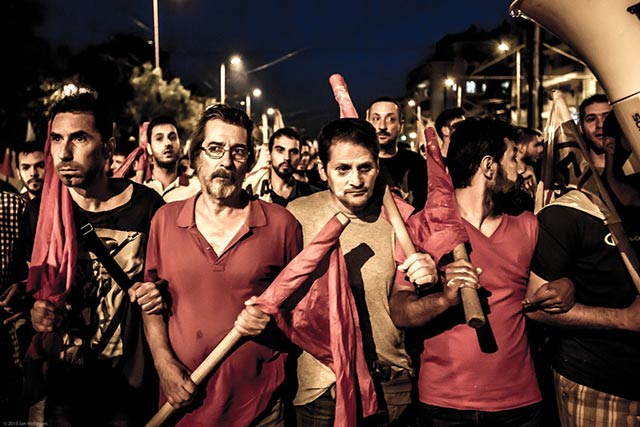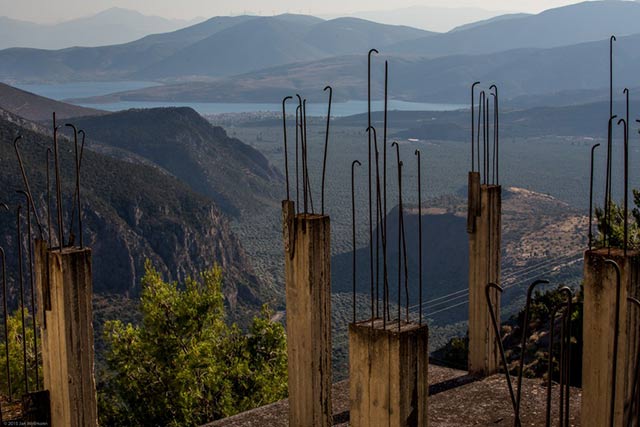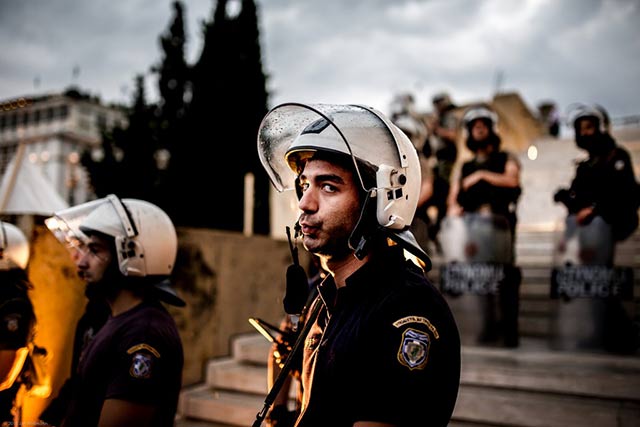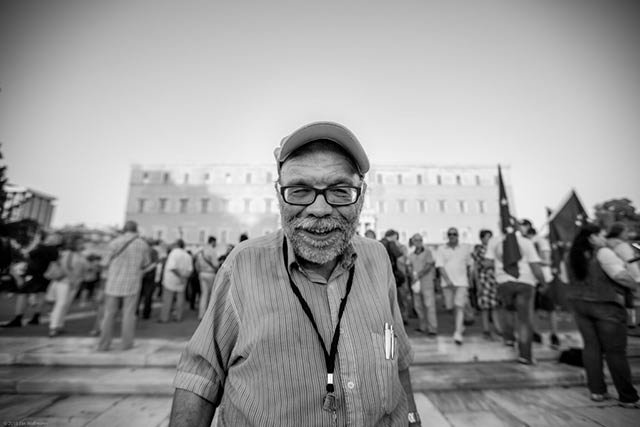
It’s the night of the Greek referendum, a landmark affair that could determine the future of Greece. Locals have gathered in Athens to feast on roasted corncobs and souvlakis, and socialize. No Molotov cocktails, no anarchists, not even so much as a scuffle. The few anxious faces belong to a few dozen foreign correspondents. They have crossed the globe to cover a story about an economic implosion – only to crash a Sunday grill party.
In this particular location, at least, it seems that the Greek response to five years of austerity measures is “Opa!” – a versatile Greek word for “whoops,” “let’s celebrate” and “shit happens.” But the reality underneath this casual veneer is much more complex than anyone can surmise.
The referendum was a magic trick. What popped out of the hat wasn’t a white bunny, but a foreclosure notice.
The referendum itself is about European Union bailout conditions. But what it is really about is dignity: an opportunity for Greeks to have a say in their destiny. The “oxi” (no) voters want an end to unconditional austerity measures. The “né” (yes) camp believes that separation from the EU would cut Greece off from the resources enjoyed by the world’s industrialized nations. Both sides believe they belong to the majority.
Some, however, realize they’ve lost control of the outcome. “I don’t see a plan to save Greece, on either side,” a waitress shrugs. “Why vote?”
Spirit prevails but only in isolated pockets. A 7-year-old boy with dreamy eyes scurries through a labyrinth of docile protesters, waving an “OXI” (“NO”) flag.
“OXI, OXI, OXI,” the boy shouts, his face lighting up. A crowd around him bursts into cheers. It’s a 61 percent majority win for the “no” voters.
 Boy on the night of Greek referendum, a devout OXI supporter. (Photo: © 2015 Jan Wellmann)
Boy on the night of Greek referendum, a devout OXI supporter. (Photo: © 2015 Jan Wellmann)
Farther out at the edge of the square the action is more akin to Madame Tussaud’s wax museum. Men play with their komboloi, also known as worry beads. Young and old men chain-smoke with glazed eyes.
“The fate of Greece has already been decided,” says a particularly grumpy old man.
“Who do you think is responsible?” I ask.
“You might as well blame the weather,” he shrugs, exhaling a cloud of smoke.
And he is right. The situation in Greece is past the blame game. It is more akin to a meteorological wonder.
Take a particularly strong storm. It is created by a rare alignment of climatic factors (temperature, pressure, wind, humidity and precipitation). When your hometown is about to get blasted, which one factor do you blame?
In the case of Greece, copious factors point to a perfect storm: the nepotistic politicians, the predatory bankers, the austerity economists, the EU policy makers, the shady corporations and the corrupt civil servants, combined with a rapidly deteriorating world economy that has pushed social inequality too long.
 Anti-austerity demonstrations in Athens. (Photo: © 2015 Jan Wellmann)
Anti-austerity demonstrations in Athens. (Photo: © 2015 Jan Wellmann)
On July 14, Alexis Tsipras’ socialist government caved in to the European troika (the European Central Bank, International Monetary Fund and the European Commission), extinguishing the rest of the government’s political capital both toward its people and the EU. It becomes clear that the referendum was a magic trick. What popped out of the hat wasn’t a white bunny, but a foreclosure notice. The new bailout conditions take the pre-referendum terms for a turbo spin – as if out of spite.
In half a decade, the Greek economy has already shrunk by a quarter. One-fourth of the population has been cast under the poverty line, with another 40 percent hovering above it, ready for a free fall. With 53 percent youth unemployment, a quarter of the population out of work, hospitals shut down, schools in disarray and 2 million pensioners living on welfare, some 1.5-2 million people are expected to provide for 11 million mouths all the while nursing an astronomical debt.
Now add another squeeze to pensions on top of already existing 40 percent reductions, contraction of labor rights and wide-ranging privatization that include the selling of 50 billion euros worth of national treasures. You don’t have to be a mathematical genius to figure out that the numbers boil down to a national hara-kiri.
 Tsipras night before the Greek referendum. (Photo: © 2015 Jan Wellmann)
Tsipras night before the Greek referendum. (Photo: © 2015 Jan Wellmann)
Sowing the Field With Salt
On July 15, the day after Tsipras yields to the latest EU bailout conditions, Dimitri, a young civil engineer and a member of the anti-capitalist Antarsya Party (antarsia stands for “mutiny”), stands tall in front of the parliament building, waving Grexit banners with half a dozen of his friends.
“Power to the people!” Dimitri shouts into a megaphone.
I ask Dimitri how he sees the future.
“We must return to drachma and organize for independence. There is no other way. The Syriza Party has failed the people who voted ‘no.’ We are the majority. The Greek debt is unsustainable, even the IMF admits this. Thousands of people are committing suicide. This cannot continue.”
“The next few years are not going to be pleasant, but Greece can’t save itself without the EU.”
Over the course of the day, the square fills up with more agitated voices. By evening, the more radical groups start throwing rocks at the police. Within seconds, several black buses scream to a halt in front of the parliament and offload hundreds of riot police. They are confronted by a convergence of approximately 2,000 demonstrators. Someone sets the first car on fire. Trash bins are lit and walls spray-painted with “OXI.” The police fire tear gas and chase demonstrators down the main street of Kallirois.
 Anarchist faction gathering on July 15 for a clash against the police. (Photo: © 2015 Jan Wellmann)
Anarchist faction gathering on July 15 for a clash against the police. (Photo: © 2015 Jan Wellmann)
In the blink of an eye, Athens is transformed. Peaceful citizens withdraw into their homes; young men rip their shirts off and get into scuffles with a phalanx of baton swinging officers.
The riot continues through the early morning hours, stretching several miles across Athens.
Maybe the time for “Opa!” is over, after all, as I find myself between a frontier of riot police and the protesters. A man next to me gets hit by a rock and falls down.
Yet, by 8 am the next morning, the streets of Athens are not only peaceful, but they’ve been cleared of debris and hosed down. The ATMs spit out 60 euros at a time as people line up.
 Demonstrators and police clash on the night of July 15. (Photo: © 2015 Jan Wellmann)
Demonstrators and police clash on the night of July 15. (Photo: © 2015 Jan Wellmann)
I have a chat with an old acquaintance, Fotis Sarantopoulos, a historical author of several published works (including one on the Balkan wars), and as of late, one of the chief organizers of the “We Stay In Europe” party, to enquire what he thinks of the riots.
“Oh, the anarchists? They come and go. It’s a marginal group. Nothing to worry about.” He chuckles.
Sarantopoulos is pleased that a Grexit could be avoided.
“The next few years are not going to be pleasant, but … Greece can’t save itself without the EU. We’ve been in this situation before.”
Sarantopoulos is referring to the 1893 bankruptcy of Greece and a host of other financial defaults the country has gone through since the early 19th century. There have been several expensive wars with Turkey for instance. But the pattern of excessive borrowing goes beyond battles. It’s a tradition.
In 1893, international creditors took control of Greece, and pensions were cut by 90 percent, but the country recovered. By 1910, the drachma was stronger than the French franc. Greece became one of the strongest economies in Europe.
 Fotis Sarantopoulos of the “We Stay In Europe” Party. (Photo: © 2015 Jan Wellmann)“There is one big challenge, though.” He raises his finger. “Do you know who the worst enemy of Greece is?”
Fotis Sarantopoulos of the “We Stay In Europe” Party. (Photo: © 2015 Jan Wellmann)“There is one big challenge, though.” He raises his finger. “Do you know who the worst enemy of Greece is?”
“The Greek,” he answers himself.
Sarantopoulos refers to the particularly Greek mentality known as zí̱lia (jealousy).
“The Greek [is] jealous if others are better off. By the time Greece was flooded with EU money, there was a rush to buy a Mercedes car or second house, simply because the other chap had one.”
And after Greece entered the eurozone in 2001, it became extremely easy to get loans for practically anything – a vacation, a big car with a 72-month payment term and, of course, swimming pools.
“It was considered stupid not to borrow,” Sarantopoulos says.
The challenge is how to make drastic reform happen when corruption is part of the national fabric.
The “Greek Miracle” (a growth phase of up to 10 percent GNP per annum) was based mostly on consumption, import of foreign goods and even agriculture versus building up their own industry and infrastructure. The massive cash flood shifted Greece to a massively dependent import economy.
And as more Greeks signed up to be civil servants, the public sector tripled to a million.
 An unfinished building in ancient valley of Delphi, Greece. (Photo: © 2015 Jan Wellmann)Meanwhile politicians used financial incentives to lure voters. The regulatory framework that provided kickbacks to politicians and bonuses to voters ballooned into a nightmare.
An unfinished building in ancient valley of Delphi, Greece. (Photo: © 2015 Jan Wellmann)Meanwhile politicians used financial incentives to lure voters. The regulatory framework that provided kickbacks to politicians and bonuses to voters ballooned into a nightmare.
“A train conductor for instance could make 7,000 euros a month with a 2,000-euro base salary and a complicated structure of bonus incentives,” Sarantopoulos says. “One bonus for cleaning your hands, another for coming to work on time. Not even the judges know what’s legal anymore.”
Easy cash also lubricated corruption to new heights.
“During the 2004 Olympic Games, all contracts were renegotiated to cover bribes. When Greece bought submarines from Germany, 10 percent went to the politicians under the table. In exchange, they paid double for the subs.”
The challenge is how to make drastic reform happen when corruption is part of the national fabric. There is no intent even to penalize, for example, political bribing. (One of the few characters who has gone to jail for corruption is former defense minister Akis Tsochatzopoulos, who alone was reported to have pocketed at least 2 billion euros.)
The other challenge is that even if Greek reform was possible, the countries and corporations doing business with Greece (like Germany, Italy and France) would discourage it. They’ve simply made too much money on the Greek grasshopper mindset that is only too happy to sacrifice long-term economic viability in exchange for short-term benefit.
This is the macroeconomic Polaroid of Greece: one party crazy enough to sow his field with salt, until the field becomes sterile. The other party sells the salt, in order to eventually cash in on the field.
 Forest fire in Athens, over the Eurobank logo, in July 2015. (Photo: © 2015 Jan Wellmann)
Forest fire in Athens, over the Eurobank logo, in July 2015. (Photo: © 2015 Jan Wellmann)
Foreclose on the Field
The classic Hollywood setup of bad versus good guy doesn’t apply here; everyone in this saga is a crook, just in varying degrees.
Not unsurprisingly, it was a Greek banker who helped Greece get into the euro soup in the first place.
In 2001, Antigone Loudiadis, working for Lloyd Blankfein and Goldman Sachs, did the arithmetic and saw an opportunity. By cooking the books with a cross-currency swap, she was able to wipe out 2 percent of the national debt – just enough for Greece to comply with euro stress tests. Goldman made $600 million and Greece made the euro.
It was the beginning of the aforementioned “Greek Miracle.” Borrowing became as easy as ordering a frappe.
While the private bankers were swimming in bailout money, they also managed to restructure their Greek debt to the public sector.
It’s not a secret that banking institutions have used leverage mechanisms to squeeze developing nations for decades, but Greece took the game to home turf. The consumption heaven lasted seven years until the subprime mortgage crisis of 2007 put a cap on it. Suddenly the private banking sector was in trouble for gambling too hard with derivatives. It had to be bailed out, or supposedly the banks themselves would collapse.
The arithmetic behind this bailout defies imagination. The Wall Street banks officially received up to $7 trillion, while some estimates put the figure at $29 trillion. The European banks received almost half a trillion.
While the private bankers were swimming in bailout money, they also managed to restructure their Greek debt to the public sector, passing the buck to European taxpayers via the troika. It’s hard to say whether the EU civil servants were fully aware of the risk scenario. The offload happened with uncanny timing, shortly before Greece crashed.
 Untangling Greece one fish at a time. Fisherman in Kiveri, Peloponnese. (Photo: © 2015 Jan Wellmann)
Untangling Greece one fish at a time. Fisherman in Kiveri, Peloponnese. (Photo: © 2015 Jan Wellmann)
Over the next five years after 2008, the troika had to inject 344 billion euros into Greece to keep it afloat – the chosen method of exchange for austerity measures.
Never mind that Nobel-prize winning economists like Paul Krugman have proven with mathematical certainty that austerity policies are basically wealth transfer mechanisms that squeeze out the lower and middle class. They have a disruptive effect on a bust economy. Small businesses get devoured, and entrepreneurs are decimated.
“The boom, not the slump, is the right time for austerity at the Treasury,” John Maynard Keynes, the father of macroeconomics, said back in 1937.
The measures had a predictable effect. Greek GNP dropped from an average of 4 percent from the previous seven years to nearly -9 percent in 2011, before shrinking a total of 25 percent by 2015.
Germany had a nice run with Greece before the subprime crash. A Der Spiegel article from 2010 describes how German companies exploited the Greek culture of corruption for decades to secure lucrative deals. The lubrication money even got its own unofficial currency denomination: “Miza.” The black currency enriched both politicians and wealthy industrialists, but laid havoc on the general populace.
Now that the heydays are over, Germany has become the toughest austerity proponent against Greece.
What Lies Beneath the Field
I have lunch with Yannis Maniatis, the former minister of environment, energy and climate change, in the small town of Kiveri, Peloponnese. He left the political office in the beginning of 2015 and is now writing a book.
“Yes, the Greek were spendthrift and yes, the system is corrupt, but so is everyone else doing business with Greece. The real problem is regulatory. For example, it used to take 14 months to pass a simple environmental license. I proposed a law that cut it down to 20 days. Of course the next government repealed it,” he says.
“Do you see any hope for Greece, with the present government?” I ask.
Maniatis formulates his words carefully.
“Considering what’s going on today, the combination of capital controls and austerity measures … there is a certain level of feeling that Greece is an … experiment.”
Maniatis is not alone in having these suspicions. Like Donald Rumsfeld once said, “There is the known, unknown and better left unsaid.” The social experiment story belongs to the “better left unsaid” category.
In the neighboring town of Xiropigados, a small hotel operator and former mechanical engineer, Christophoros, 43, points me toward both the unknown and better left unsaid.
“All this data has been online since 2012. The EU forced the government to publish it. But still no one talks about it. “
Christophoros is a detail-oriented fellow and judging by the amount of research he’s done, a veritable investigator. Unable to get a job in his field, he decided to help his parents with their hotel operation.
“For decades, they put everything into this hotel. Today, we would probably have to pay some German investor 10,000 euros to sell it,” Christophoros says.
He pulls out a stack of papers containing government reports.
He points to a few basic line items for 2015:
- Total revenues (taxes and other): 53 billion euros
- Operating budget: 148 billion euros
- Required borrowing: 95 billion euros
- Total outstanding debt: 360 billion euros
- Loans to the banks: 250 billion euros (with 100 billion euros marked “uncollectible”)
- Uncollected taxes: 80 billion euros
“What none of these figures explain, however, is the invisible debt. Let me give you an example. Some friends of ours nearby have a small hotel they built for 4 million euros, fully bank-financed. You know how much they were offered for the hotel recently? 500 euros. The owners offered the bank back the hotel at no cost to avoid real estate taxes and the bank said, ‘No thank you.'”
Thousands of real estate loans were made during the seven-year Greek Miracle, many of them 200-400 million-euro mega hotels. Those properties are now considered near worthless. The banks refuse to take them back because it would expose a black hole in their balance sheet to the European Central Bank. Many of the owners operate the hotels and pocket the money directly, without bothering to cover the bank interest. The banks have stopped attempts to collect.
“It’s a bubble inside a bubble, a bit like another 2008, at least another 250 billion euros worth. Maybe a lot more,” says Christophoros. “Once the ECB finds out about the second bubble, they can decide to close on Greece.”
Greece is the first modern European country that is being wiped out methodically with a silent, financial takeover that reassigns its wealth to a select few.
 Riot police is fed up by photographing journalists on Syntagma Square, Athens. (Photo: © 2015 Jan Wellmann)
Riot police is fed up by photographing journalists on Syntagma Square, Athens. (Photo: © 2015 Jan Wellmann)
The Sun Also Rises in Greece
The story of Greece may seem hopeless, but there is a flip side.
Smart and innovative Greek entrepreneurs are devising ways to shortcut the rules of capital controls and austerity measures. They want to create their own economy.
 Christiana Gardikioti in her hometown Agios Ioannis. (Photo: © 2015 Jan Wellmann)Take Christiana Gardikioti, 56, a former Merrill Lynch executive who is inviting world-renowned experts to advise her on how to build a sustainable community in her mountain hometown of Agios Ioannis. While business in the village is dying, her idea is to start producing food; take over the vertical control of industries like Greece’s olive oil (currently being dumped in Italy at bargain prices and passed off as Italian olive oil); leverage alternative energy, desalination and waste-to-energy solutions; and create a success story that will inspire other communities to do the same.
Christiana Gardikioti in her hometown Agios Ioannis. (Photo: © 2015 Jan Wellmann)Take Christiana Gardikioti, 56, a former Merrill Lynch executive who is inviting world-renowned experts to advise her on how to build a sustainable community in her mountain hometown of Agios Ioannis. While business in the village is dying, her idea is to start producing food; take over the vertical control of industries like Greece’s olive oil (currently being dumped in Italy at bargain prices and passed off as Italian olive oil); leverage alternative energy, desalination and waste-to-energy solutions; and create a success story that will inspire other communities to do the same.
Another example is Dimitri Haritos, 43, a serial entrepreneur from Athens. He grew up in Brussels with Greek parents who were positioned at the highest levels of the European Commission.
“A currency union should include a realistic plan on how to restructure a smaller economy to be more competitive,” Haritos says. “Greece needed a business plan, a clear restructuring phase before joining the euro. Instead, we were cast in the same boxing ring with Germany without preparation.”
 Dimitri Haritos with his 7-year old Taekwondo practicing daughter, Anna. (Photo: © 2015 Jan Wellmann)
Dimitri Haritos with his 7-year old Taekwondo practicing daughter, Anna. (Photo: © 2015 Jan Wellmann)
Despite the seemingly hopeless situation, Haritos believes that Greece can be turned around – in a very rapid manner.
“The agricultural, tourism, health and energy sectors have unlimited potential. We have 300 days of sun per year. We can grow our agriculture year round in fertile land. Solar and wind energy work here better than almost anywhere else in Europe,” says Haritos, who is networking with leading businessmen to unite agricultural entrepreneurs and empower them with a real-time auction platform.
“We need maybe 300 leaders to come together to turn Greece around,” he adds, smiling, referring to the 300 Spartans who once blocked the Persian army in one of history’s most famous last stands. “We can streamline the market mechanisms, assure quality control and re-establish trust by eliminating the middlemen. We need to take control of our own brands and margins in a transparent manner.”
Greece is showing us that massive currency and trade unions that organize their principles around money first and people second are doomed to fail in the long-term.
Greece is a teacher, not an experiment.
Not that globalization is bad per se. But a purely currency-fueled system that promotes inequality and stifles a cultural minority goes against the very basics of evolution, which is about fostering diversity.
 Bernis, at Syntagma Square. (Photo: © 2015 Jan Wellmann)
Bernis, at Syntagma Square. (Photo: © 2015 Jan Wellmann)
During the July 15 demonstrations at Syntagma Square, an old man pulls me aside. He introduces himself simply as “Bernis.” Bernis is a former pharmacist and an entrepreneur. He has a hunch so deep that I have to lean in 45 degrees to listen to him. He talks for an hour about how the Greek people survived wars and catastrophes throughout millennia.
Bernis carries a EU flag. I ask him why he’s pro-EU.
“It’s the fastest way to collapse and rebirth,” the little man says with a wide smile.
 (Photo: © 2015 Jan Wellmann)
(Photo: © 2015 Jan Wellmann)
Join us in defending the truth before it’s too late
The future of independent journalism is uncertain, and the consequences of losing it are too grave to ignore. We have hours left to raise the $12,0000 still needed to ensure Truthout remains safe, strong, and free. Every dollar raised goes directly toward the costs of producing news you can trust.
Please give what you can — because by supporting us with a tax-deductible donation, you’re not just preserving a source of news, you’re helping to safeguard what’s left of our democracy.